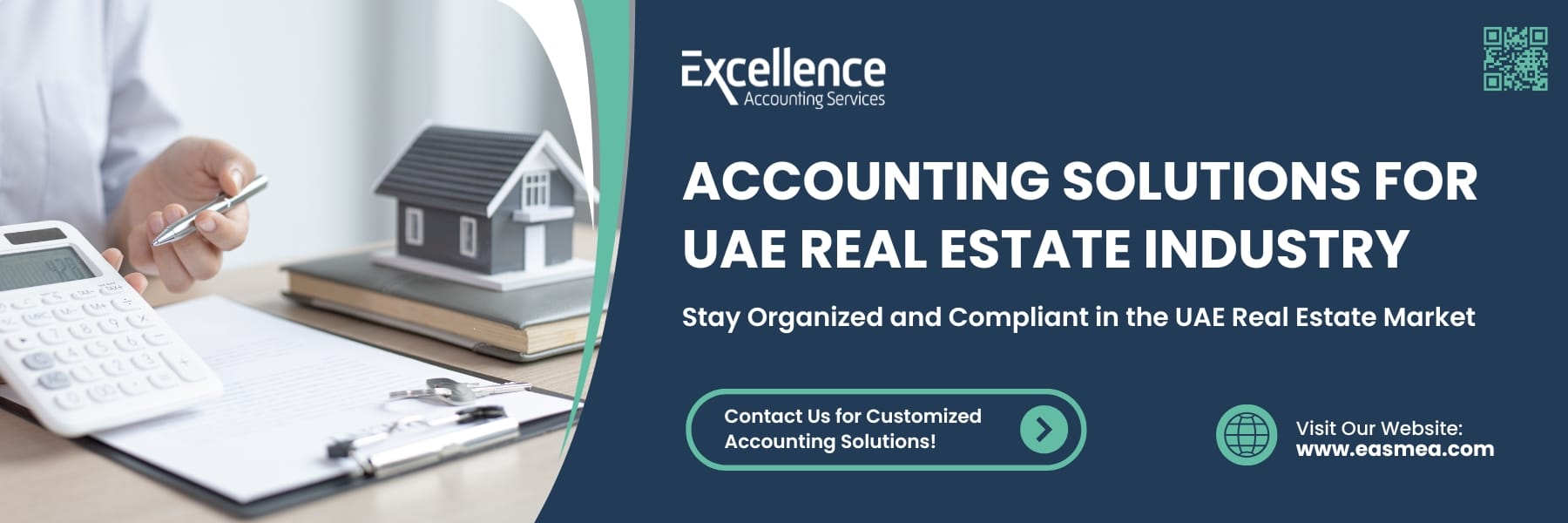Accounting tips for real estate businesses are essential for navigating the UAE’s dynamic property market. In the UAE, the real estate market is a cornerstone of economic growth, contributing significantly to the country’s GDP and providing a robust platform for investment opportunities.
- Key Reasons to Prioritize Accounting for Real Estate Business in Dubai
- Essential Accounting Tips for Real Estate Businesses
- Overcoming Common Accounting Challenges
- The Role of Financial Planning in Real Estate
- Understanding Financial Metrics for Real Estate
- Cash Flow Strategies for Real Estate Developers
- Tax Optimization Strategies for Real Estate Businesses
- How to Prepare for Financial Audits in Real Estate
- Tools and Technologies for Real Estate Accounting
- Frequently Asked Questions (FAQs)
Whether dealing with residential, commercial, or industrial properties, real estate businesses encounter complex financial challenges, including fluctuating market dynamics, regulatory requirements, and diverse revenue streams. Accurate accounting practices are indispensable for navigating these challenges effectively.
They ensure adherence to UAE laws, optimize cash flow management, support strategic decision-making, and enhance overall profitability. By maintaining precise financial records and adopting best practices, real estate firms can build resilience, gain investor confidence, and position themselves for sustainable growth in a competitive market.
Key Reasons to Prioritize Accounting for Real Estate Business in Dubai
| Key Aspect | Explanation |
|---|---|
| Regulatory Compliance | The UAE’s financial reporting and tax regulations are stringent. Accurate accounting ensures adherence to VAT requirements, corporate tax laws, and other regulatory mandates. Staying compliant avoids hefty fines and enhances credibility with regulatory authorities. |
| Cash Flow Management | Real estate businesses often deal with large transactions and periodic revenue streams. Proper accounting helps track income and expenses, ensuring sufficient liquidity to cover operational costs, unexpected expenses, and new investments. |
| Profit Maximization | Detailed financial records provide insights into profitable ventures and highlight areas where costs can be reduced. By analyzing these records, businesses can make informed decisions that directly improve their bottom line. |
| Investor Confidence | Transparent financial practices build trust with stakeholders and investors. Providing clear and accurate financial data assures investors of your business’s stability, making it easier to attract funding or partnerships. |
Essential Accounting Tips for Real Estate Businesses
Managing finances in the real estate sector can be challenging due to the complexity of transactions, regulatory requirements, and market dynamics. Here are detailed tips to help streamline your accounting processes and ensure compliance:
1. Implement a Robust Accounting System
- Choose Specialized Software: Select accounting software designed for real estate operations, offering features like lease tracking, property management, and VAT compliance. Examples include Yardi, QuickBooks Online, and Zoho Books.
- Automate Processes: Automation reduces manual errors and enhances efficiency, especially for recurring tasks like rent collection or tax calculations.
- Ensure Scalability: Choose a system that supports your business’s growth, accommodating an expanding portfolio of properties and clients.
2. Track Income and Expenses Separately
- Categorize Revenue Streams: Differentiate between income sources such as property sales, rentals, and management services to provide clear financial insights.
- Monitor Expenses: Maintain detailed records of operational costs, marketing campaigns, maintenance charges, and property upgrades.
- Use Digital Tools: Leverage apps and software to track transactions in real time, making it easier to monitor cash flow and profitability.
3. Master VAT Compliance
- Understand VAT Obligations: Differentiate between VAT-applicable and exempt transactions, especially for commercial and residential properties.
- Keep Detailed Invoices: Ensure all invoices meet Federal Tax Authority (FTA) standards, including supplier details, transaction dates, and VAT amounts.
- File Returns on Time: Avoid penalties by submitting accurate VAT returns promptly through the FTA portal. Use accounting software to simplify the process and reduce errors.
4. Engage Professional Accountants
- Specialized Expertise: Hire accountants with real estate experience to navigate complex financial transactions and compliance requirements.
- Advisory Services: Professionals can provide insights into optimizing tax benefits and improving cash flow management.
- Audit Preparation: Accountants can ensure your financial records are audit-ready, reducing stress during regulatory reviews.
5. Adopt Regular Financial Audits
- Internal Checks: Schedule periodic internal audits to identify discrepancies and rectify errors early.
- Compliance Assurance: Audits ensure that your business adheres to UAE financial regulations and tax laws.
- Performance Insights: Use audit findings to make informed decisions about property investments, cost-cutting, and revenue optimization.
By implementing these accounting tips, real estate businesses can maintain compliance, optimize operations, and improve financial transparency, laying the groundwork for sustained growth and profitability.
Overcoming Common Accounting Challenges
Navigating the complexities of accounting in the real estate sector requires proactive strategies and a deep understanding of the challenges unique to the industry. Here are some of the most common challenges real estate businesses face and practical solutions to overcome them:
1. Managing Multiple Properties
Real estate firms often oversee a diverse portfolio of properties, each with its own set of revenue streams and associated costs. This diversity can complicate financial tracking and reporting.
- Solution: Implement property-specific accounting practices that allow for separate tracking of income and expenses for each property. Invest in software with multi-property management features to automate and streamline this process. This ensures that you have a clear financial picture of each property’s performance, enabling better decision-making.
2. Navigating VAT and Tax Compliance
The UAE’s VAT and corporate tax regulations can be intricate, particularly for businesses handling a mix of taxable and exempt transactions. Missteps in compliance can lead to significant penalties.
- Solution: Engage professional tax advisors who specialize in real estate. Their expertise can help you understand the nuances of VAT obligations, such as distinguishing between VAT-applicable and exempt transactions. Additionally, ensure your accounting team is well-trained in UAE tax laws and equipped to file accurate returns on time.
3. Maintaining Accurate Records
Incomplete or poorly organized financial records are a common issue that can lead to compliance challenges, missed deductions, and difficulties during audits.
- Solution: Digitize your record-keeping processes using cloud-based tools that provide secure, real-time access to financial documents. Conduct regular internal audits to ensure all records are complete, accurate, and up-to-date. Establish standardized procedures for storing and categorizing documents, such as invoices, receipts, and contracts.
4. Handling Irregular Cash Flows
Real estate businesses often experience uneven cash flows due to the cyclical nature of sales, leases, and maintenance costs. This inconsistency can strain liquidity and operational stability.
- Solution: Develop a cash flow management strategy that includes maintaining a reserve fund for unexpected expenses and investing in forecasting tools to predict cash flow trends. Regularly review your financial data to adjust budgets and ensure liquidity during low-revenue periods.
5. Adapting to Market Volatility
Fluctuations in the real estate market, such as changes in property demand or regulatory updates, can impact financial planning and performance.
- Solution: Stay informed about market trends and regulatory changes through industry reports and professional networks. Build financial flexibility into your business model to adapt quickly to market shifts, such as reallocating resources to high-demand properties or adjusting pricing strategies.
By addressing these challenges with targeted solutions, real estate businesses in the UAE can enhance their financial management, ensure compliance, and achieve sustained growth.
The Role of Financial Planning in Real Estate
Financial planning is a cornerstone of success in the real estate industry, particularly in a dynamic market like the UAE. It encompasses the strategic management of resources to ensure profitability, growth, and long-term sustainability. Both short-term and long-term planning are essential for navigating market fluctuations and aligning business goals with economic conditions.
Importance of Short-Term and Long-Term Financial Planning
| Planning Type | Key Focus Areas |
| Short-Term Planning | Day-to-day financial management, such as tracking operational costs, managing cash flow, and ensuring timely payments to vendors and stakeholders. |
| Long-Term Planning | Investment in properties, portfolio diversification, and preparing for market changes by leveraging trends and predicting future cash flow. |
Aligning Financial Goals with Real Estate Market Trends
- Market Analysis: Understanding trends like demand for commercial spaces or residential units helps businesses adjust their strategies.
- Risk Assessment: Real estate markets can be volatile. Financial planning helps identify and mitigate risks associated with fluctuating prices or interest rates.
- Investment Prioritization: Focus resources on projects with the highest potential ROI while maintaining a balanced portfolio.
Tools for Effective Financial Planning
- Budgeting Software: Tools like Yardi Breeze and Buildium assist in creating accurate financial plans tailored to real estate operations.
- Forecasting Models: Use predictive analytics to estimate future revenue streams and expenses.
- Professional Consultation: Engaging financial planners with expertise in real estate ensures robust strategies aligned with business goals.
Effective financial planning not only enhances operational efficiency but also provides a clear roadmap for achieving both short-term and long-term business objectives.
Understanding Financial Metrics for Real Estate
Understanding financial metrics is critical for evaluating the performance and profitability of real estate businesses. These metrics provide actionable insights that guide investment decisions, operational improvements, and financial planning. Here are key performance indicators (KPIs) and how to use them effectively:
Key Performance Indicators (KPIs) for Real Estate
- Net Operating Income (NOI):
- Definition: NOI measures the profitability of a property by subtracting operating expenses (excluding taxes and interest) from total revenue.
- Use: Helps evaluate the efficiency of property management and predict future cash flow.
- Cash-on-Cash Return:
- Definition: A metric that calculates the annual return on cash invested in a property, expressed as a percentage.
- Use: Ideal for comparing the profitability of different investments and assessing short-term returns.
- Return on Investment (ROI):
- Definition: Measures the overall profitability of an investment by dividing net profit by the total investment cost.
- Use: Assists in determining whether a property investment is worth pursuing.
- Debt Service Coverage Ratio (DSCR):
- Definition: DSCR evaluates a property’s ability to cover its debt obligations with net operating income.
- Use: Critical for securing financing and assessing financial health.
- Occupancy Rate:
- Definition: The percentage of available rental units that are occupied.
- Use: Indicates the demand for a property and impacts revenue predictions.
How to Use These Metrics for Decision-Making
- Evaluate Property Performance:
- Compare NOI and occupancy rates across properties to identify high-performing assets.
- Address underperforming properties by reviewing expense management and marketing strategies.
- Guide Investment Decisions:
- Use ROI and cash-on-cash return to evaluate potential investments and prioritize the most profitable opportunities.
- Monitor Financial Health:
- Leverage DSCR to ensure properties generate sufficient income to meet debt obligations, avoiding financial strain.
- Forecast Future Trends:
- Analyze historical data from these metrics to predict market trends and inform long-term planning.
By consistently tracking and analyzing these financial metrics, real estate businesses can improve operational efficiency, enhance profitability, and make informed strategic decisions.
Key performance indicators (KPIs) for real estate businesses.
Metrics like net operating income (NOI), cash-on-cash return, and ROI.
How to use these metrics for decision-making.
Cash Flow Strategies for Real Estate Developers
Effective cash flow management is a cornerstone of success for real estate developers. With the cyclical nature of the industry and substantial upfront investments, maintaining a steady cash flow is essential for operational stability and project completion. Here are some comprehensive strategies tailored for real estate developers:
Best Practices for Managing Cash During Project Cycles
- Create Detailed Cash Flow Projections:
- Develop accurate forecasts for inflows and outflows during the project lifecycle.
- Factor in expected delays, market fluctuations, and unexpected expenses to ensure realistic budgeting.
- Implement Phased Development:
- Break projects into manageable phases to control expenses and generate revenue progressively.
- Utilize earnings from earlier phases to fund subsequent stages, minimizing the need for external financing.
- Diversify Revenue Streams:
- Incorporate multiple income sources, such as rentals, property management services, or consultancy fees, to maintain steady inflows.
- Reducing dependence on a single revenue stream mitigates risk.
The Importance of Cash Reserves in Handling Unexpected Costs
- Establish an Emergency Fund:
- Allocate a portion of your budget as a contingency reserve to address unforeseen expenses, such as market downturns or construction delays.
- Monitor Overhead Costs:
- Regularly review operational expenses to identify areas for cost reduction without compromising quality.
- Leverage Lines of Credit:
- Maintain access to credit facilities for emergencies, ensuring liquidity during critical phases.
Tools to Predict and Analyze Cash Flow Trends
- Accounting Software:
- Use platforms like Zoho Books or QuickBooks to automate cash flow tracking and generate real-time insights.
- Monitor patterns and identify potential cash shortages early.
- Financial Dashboards:
- Implement dashboards that consolidate financial data, offering a visual representation of cash flow trends.
- Forecasting Models:
- Adopt predictive analytics to anticipate revenue fluctuations and plan expenses accordingly.
By adopting these strategies, real estate developers can ensure consistent cash flow, mitigate risks, and position their projects for long-term success.
Tax Optimization Strategies for Real Estate Businesses
Tax optimization is a critical aspect of financial planning for real estate businesses in the UAE. By strategically managing tax obligations, businesses can reduce liabilities, enhance cash flow, and improve overall profitability. Here are some effective strategies tailored to the real estate sector:
1. Utilize Common Tax Deductions and Exemptions
- Operational Expenses: Deduct costs related to property maintenance, utilities, and employee salaries, where applicable.
- Loan Interest: Claim deductions on interest payments for loans used in property development or acquisition.
- Depreciation: Maximize allowable deductions on property depreciation to offset taxable income.
2. Leverage Free Zone Tax Benefits
- Tax-Free Environment: Businesses operating in free zones can benefit from corporate tax exemptions on qualifying income.
- Eligibility Criteria: Ensure compliance with free zone regulations, such as maintaining adequate local operations or engaging in permitted activities.
- Planning for Growth: Strategically allocate resources to free zone operations to maximize tax savings.
3. Plan Depreciation for Properties
- Asset Classification: Accurately categorize assets to determine applicable depreciation rates.
- Depreciation Schedules: Develop clear schedules to align with UAE tax laws, ensuring maximum benefit.
- Capital Improvements: Distinguish between maintenance expenses and capital improvements to claim appropriate deductions.
4. Engage Tax Professionals
- Specialized Expertise: Work with advisors experienced in UAE real estate taxation to identify opportunities and ensure compliance.
- Tax Audits: Prepare for regulatory reviews with the help of professionals to mitigate risks and enhance reporting accuracy.
- Strategic Advisory: Leverage their insights for long-term tax planning and optimization.
5. Stay Updated on Tax Regulations
- Continuous Learning: Regularly attend industry seminars, workshops, and updates from the Federal Tax Authority (FTA).
- Adapt Strategies: Adjust tax planning techniques to accommodate changes in regulations or economic conditions.
By implementing these strategies, real estate businesses in the UAE can reduce their tax burden, maintain compliance, and focus on growth opportunities.
How to Prepare for Financial Audits in Real Estate
Financial audits are an integral part of maintaining compliance and demonstrating transparency in the real estate sector. A successful audit requires thorough preparation, adherence to regulatory standards, and proactive identification of potential issues. Here is a detailed guide to preparing for financial audits in real estate, including best practices and actionable tips:
Checklist for Audit Readiness
| Preparation Step | Details |
|---|---|
| Organize Financial Records | Gather all invoices, contracts, receipts, and bank statements. Ensure they are accurate and complete. |
| Verify Compliance | Review financial practices to ensure they align with UAE’s VAT and corporate tax laws. |
| Review Property-Specific Data | Separate income and expenses for each property to provide clarity during the audit process. |
| Engage Professional Accountants | Collaborate with accountants experienced in real estate to identify and address potential discrepancies. |
| Update Internal Policies | Ensure that financial policies are up-to-date and reflect the latest regulatory requirements. |
Best Practices for Presenting Financial Data
| Best Practice | Explanation |
| Use Standardized Reports | Prepare financial statements in formats commonly accepted by auditors, such as balance sheets and cash flow reports. |
| Provide Supporting Documents | Attach relevant documentation for all major transactions, such as property acquisitions or significant expenses. |
| Highlight Key Metrics | Showcase KPIs such as Net Operating Income (NOI) and Return on Investment (ROI) to demonstrate business performance. |
| Ensure Accuracy | Double-check all figures to avoid errors or inconsistencies that could raise red flags during the audit. |
Addressing Common Audit Findings Proactively
| Common Issue | Solution |
| Incomplete Records | Implement cloud-based tools to ensure all records are stored securely and are easily accessible. |
| Inconsistent Financial Data | Regularly reconcile accounts and conduct internal audits to identify and resolve discrepancies early. |
| Non-Compliant Practices | Engage tax professionals to review and rectify non-compliant activities before the audit begins. |
By following these steps and utilizing best practices, real estate businesses can approach financial audits with confidence, ensuring compliance and building trust with stakeholders.
_____
Tools and Technologies for Real Estate Accounting
Modern accounting tools and technologies have revolutionized financial management for real estate businesses. These tools not only simplify complex tasks but also ensure accuracy, compliance, and efficiency. Here’s a detailed look at recommended tools and their benefits:
Recommended Tools
| Tool | Features | Benefits |
| QuickBooks Online | Lease tracking, expense categorization, and multi-user access | Simplifies management of multiple properties and ensures accurate financial reporting. |
| Xero | Real-time financial insights, customizable dashboards | Enhances decision-making with real-time updates and tailored reports. |
| Zoho Books | VAT compliance, automated reporting, and integration with other business tools | Ensures adherence to regulatory standards while streamlining operations. |
| Buildium | Property management tools, tenant communication, and rent tracking | Combines accounting with property management for end-to-end financial oversight. |
| Yardi Breeze | Cloud-based solutions for small to medium-sized portfolios | Offers scalability and comprehensive financial management for growing businesses. |
Key Features to Look For in Accounting Tools
- VAT Compliance: Tools that automatically calculate and track VAT ensure adherence to UAE regulations and reduce the risk of penalties.
- Multi-Property Management: Software that allows separate tracking of income and expenses for different properties simplifies financial analysis.
- Integration Capabilities: The ability to integrate with CRM and property management systems enhances operational efficiency.
- Real-Time Insights: Dashboards and reports that provide real-time updates help in making informed financial decisions.
Benefits of Using Technology in Real Estate Accounting
- Efficiency: Automates repetitive tasks like invoice generation and rent collection.
- Accuracy: Minimizes errors in financial reporting and compliance.
- Scalability: Supports business growth by managing increasing complexities with ease.
- Compliance Assurance: Keeps businesses aligned with the latest tax and regulatory requirements.
By adopting these tools and technologies, real estate businesses in the UAE can optimize their accounting processes, enhance financial transparency, and position themselves for long-term success.
Frequently Asked Questions (FAQs)
Accurate financial reporting, cash flow management, and compliance with VAT laws are essential for the success of real estate businesses in the UAE.
These practices ensure transparency, build trust with investors, and maintain regulatory compliance. Additionally, real estate firms must diligently track property-specific income and expenses to gain granular insights into the profitability of individual assets.
This enables informed decision-making, effective resource allocation, and the ability to identify underperforming properties for improvement or divestment. Leveraging digital tools and engaging professional accountants can further enhance the accuracy and efficiency of these processes.
Implement cloud-based accounting tools, such as QuickBooks or Zoho Books, to centralize financial data and ensure real-time access to critical information.
Automate repetitive tasks like invoice generation, expense tracking, and VAT calculations to reduce manual errors and save time.
Additionally, engage professional accountants with expertise in real estate to navigate complex financial regulations, optimize tax planning, and provide strategic insights tailored to your business operations.
Sales and leases of commercial properties are subject to VAT at the standard rate of 5%, while residential leases are generally exempt from VAT unless the property falls under specific taxable categories, such as short-term rentals.
Accurate record-keeping is crucial to differentiate between taxable and non-taxable transactions, ensuring compliance with Federal Tax Authority (FTA) regulations. Maintaining detailed invoices and categorizing transactions appropriately helps businesses claim input VAT on eligible expenses while avoiding penalties for misclassification.
Cash flow management is crucial for real estate businesses as it ensures the availability of liquidity to handle operational expenses, project development, and unforeseen costs. Real estate projects often involve significant upfront investments, and revenue may be delayed until properties are sold or leased.
Efficient cash flow management allows businesses to cover these gaps, maintain steady operations, and avoid financial strain. Additionally, well-managed cash flow enhances the ability to reinvest in new projects, negotiate better deals with suppliers, and build trust with stakeholders. Leveraging cash flow forecasting tools and maintaining a reserve fund further supports stability and growth in a competitive market.
Leverage deductions on allowable expenses, such as maintenance costs, property depreciation, and loan interest, to reduce taxable income effectively. Maintain accurate and well-organized records, including detailed invoices and receipts, to ensure compliance with tax regulations and facilitate smooth audits.
Additionally, consult with experienced tax advisors to identify opportunities for tax optimization, such as utilizing free zone benefits or structuring transactions to minimize liabilities. These proactive measures not only optimize tax planning but also enhance overall financial health and operational efficiency.
Use software like QuickBooks Online, Xero, or Zoho Books for features like multi-property management, automated VAT compliance, real-time financial tracking, and integration with property management tools.
These platforms help businesses maintain accurate records, streamline operations, and ensure adherence to UAE regulatory requirements, ultimately improving decision-making and profitability.
Organize all financial records systematically by using cloud-based accounting systems to store and manage invoices, receipts, contracts, and transaction data securely.
Ensure compliance with UAE laws by adhering to Federal Tax Authority (FTA) standards for VAT reporting and corporate tax obligations.
Conduct regular internal audits to identify and address discrepancies early, enhancing accuracy and preparing for external audits or regulatory reviews.
Professionals bring in-depth expertise in compliance, financial analysis, and tax optimization, ensuring that businesses stay aligned with regulatory requirements while identifying opportunities for cost savings.
They streamline complex financial processes, mitigate risks associated with inaccuracies, and provide strategic insights that can drive operational efficiency and profitability.
By leveraging their knowledge, businesses save time, reduce errors, and gain confidence in their financial management strategies.
Financial records should be updated daily or weekly to ensure accuracy, prevent errors, and provide timely insights into business performance.
Regular updates allow for better decision-making, improved compliance with regulatory requirements, and easier preparation for audits or tax filings.
Using cloud-based accounting software can streamline this process by automating data entry and providing real-time access to financial information.
Accurate financial reporting, cash flow management, and compliance with VAT laws are essential for the success of real estate businesses in the UAE.
These practices ensure transparency, build trust with investors, and maintain regulatory compliance. Additionally, real estate firms must diligently track property-specific income and expenses to gain granular insights into the profitability of individual assets.
This enables informed decision-making, effective resource allocation, and the ability to identify underperforming properties for improvement or divestment. Leveraging digital tools and engaging professional accountants can further enhance the accuracy and efficiency of these processes.





